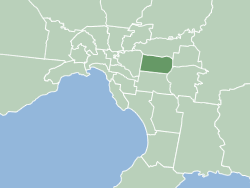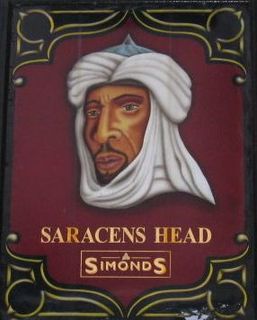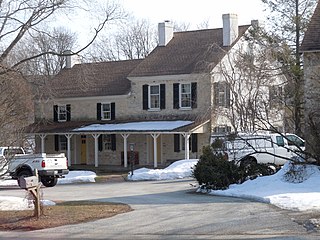The White Horse Inn is a 1930 operetta set in Austria.
White Horse Inn, , is an operetta or musical comedy by Ralph Benatzky and Robert Stolz in collaboration with a number of other composers and writers, set in the picturesque Salzkammergut region of Upper Austria. It is about the head waiter of the White Horse Inn in St. Wolfgang who is desperately in love with the owner of the inn, a resolute young woman who at first only has eyes for one of her regular guests. Sometimes classified as an operetta, the show enjoyed huge successes both on Broadway and in the West End and was filmed several times. In a way similar to The Sound of Music and the three Sissi movies, the play and its film versions have contributed to the saccharine image of Austria as an alpine idyll—the kind of idyll tourists have been seeking for almost a century now. Today, Im weißen Rößl is mainly remembered for its songs, many of which have become popular classics.
The White Horse Inn may also refer to:
- Places
- White Horse Inn (Oakland, California)
- White Horse Tavern, Cambridge, also known as the White Horse Inn
- Old White Horse Inn, Bingley, West Yorkshire
- White Horse Inn, after which Whitehorse Road in City of Whitehorse was named

The White Horse Inn is a gay bar located at 6551 Telegraph Avenue in Oakland's Bushrod Park neighborhood. It officially opened in 1933 but is rumored to have operated as a gay speakeasy since before the end of Prohibition. It is said to be the oldest continuously operating gay bar in the United States, along with Cafe Lafitte in New Orleans, Louisiana which has also operated since 1933. The White Horse is situated geographically near the Oakland-Berkeley border and in close proximity to the University of California, Berkeley campus.

The 'White Horse Tavern' or 'White Horse Inn' was allegedly the meeting place in Cambridge for English Protestant reformers to discuss Lutheran ideas, from 1521 onwards. According to the historian Geoffrey Elton the group of university dons who met there were nicknamed 'Little Germany' in reference to their discussions of Luther. Whilst the pub undoubtedly existed, several scholars have questioned the existence of the 'White Horse' meetings - they are described by John Foxe in his Book of Martyrs, but no other evidence for them exists. Gergely M Juhász writes that 'Foxe’s romantic image of these students and scholars convening secretly on a regular basis in the White Horse Inn… is unsubstantiated', and Alec Ryrie refers to it as 'the stubborn legend of the White Horse Inn.'
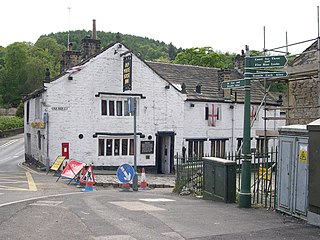
The Old White Horse Inn in Bingley, West Yorkshire, England, is one of the oldest buildings still in use in the town. It was originally constructed as a coaching inn in the mid-seventeenth century, strategically positioned with Ireland Bridge on the one side and the Parish church on the other. The building is an English Grade II listed building and has a significant amount of coaching inn infrastructure surviving including a stable, barn and two coach entrances which are located around an inner courtyard. On each side of the gable are stone lanterns that denote the former owners Order of Knights of St John of Jerusalem. There is evidence that a hostelry has been on the site since 1379.
- Entertainment
- The White Horse Inn, a radio show hosted by Michael Horton named after the inn in Cambridge
- The White Horse Inn (1926 film)
- The White Horse Inn (1935 film)
- White Horse Inn (1948 film)
- The White Horse Inn (1952 film)
- The White Horse Inn (1960 film)
- The White Horse Inn (Broadway version)
Michael Scott Horton is the J. Gresham Machen Professor of Theology and Apologetics at Westminster Seminary California since 1998, Editor-in-Chief of Modern Reformation (MR) magazine, and President and host of the nationally syndicated radio broadcast, The White Horse Inn. Both Modern Reformation magazine and The White Horse Inn radio broadcast are now entities under the umbrella of White Horse Media, whose offices are located on the campus of Westminster Seminary California.
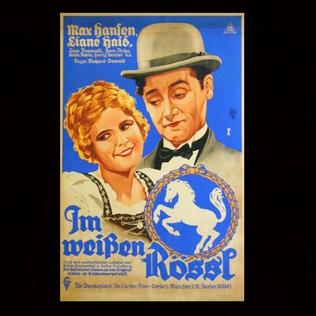
The White Horse Inn is a 1926 German silent comedy film directed by Richard Oswald and starring Liane Haid, Max Hansen and Henry Bender. It is based on the play The White Horse Inn by Oskar Blumenthal and Gustav Kadelburg.
The White Horse Inn is a 1935 Germany musical film based on the musical comedy by Ralph Benatzky and Robert Stolz.


